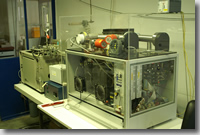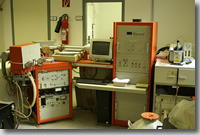

Address
GEO-data, Dienstleistungsgesellschaft für Geologie, Hydrogeologie und Umweltanalytik mbH
Carl-Zeiss-Str. 2
30827 Garbsen
Phone
Telephone: 05131/7099-0
Telefax: 05131/7099-60
Business hours
Mo. - Fr. 07:30 bis 16:30 Uhr
Stable Isotope Analytics
Exploration:
 |
Stable isotopes in natural gases are the only properties that provide direct information on the temperature of gas formation. Thus predictions of source rock maturity, gas potential and the time of the gas generation can be derived. Such information can be obtained early in the exploration process by the analyses of the mud gases at the rig site. |
Production:
Gas isotope analyses of mud gases permit the forecast of reservoir compartments. This information is important for the completion of the well in the reservoir. Gas isotope analyses from different well sites in one area can provide information over the vertical and lateral distribution of compartments, giving more details of compartment- communication than it is possible to obtain with seismic data interpretation. Such kind of information is important for the planning of new wells in existing fields (In-Field-Drilling). Gas isotope analyses in horizontal wells can indicate different pressure compartments. In shale-gas wells isotope analyses can be used, to indicate the maturity and gas potential of a prospect. |
 |
During the operation of underground gas storage facilities, gas isotope analyses of the injected and the extracted gas can reveal information on the exchange-quantities in the storage itself. With the systematic monitoring of these gases, data can be collected showing the mixing of native and storage gas. Similar applications exist also in the operation of geological CO2 underground storage facilities.
In the environmental analytics gas isotope analyses of ground waters can provide information about bacterial processes in the ground-water reservoir. The bacterial decomposition of organic contamination (e.g. gasoline derivatives) can be detected by isotope analyses.

